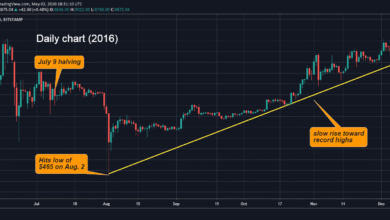Capital One Lawsuit: NY AG Accuses Bank Of Cheating Customers

On Wednesday, the New York Attorney General filed a significant lawsuit against Capital One, alleging that the bank deceived consumers by withholding vital information regarding its high-yield savings accounts. According to the complaint, customers using the Capital One 360 Savings account were left unaware of the more lucrative 360 Performance Savings, which boasted interest rates soaring as high as 4.35%. This allegedly resulted in New York customers missing out on millions in interest earnings, raising serious concerns about interest rate fraud and consumer financial protection. With claims echoing a previous lawsuit from the Consumer Financial Protection Bureau, the ongoing legal battle casts a spotlight on the ethical practices of major banks. Attorney General Letitia James emphasized that such deception undermines public trust and accountability in the banking sector as she seeks restitution for affected customers.
In a notable development, the recent legal action against Capital One has sparked widespread discussion about the transparency of banking institutions regarding savings products. Known for its range of financial services, Capital One faces accusations of misleading customers regarding the advantages of its savings accounts. The lawsuit highlights crucial issues of consumer rights and the regulatory obligations banks have toward their clients, particularly in promoting high-yield savings accounts like the Capital One 360 Performance Savings. As investigations unfold, the focus remains on whether consumers were adequately informed about better investment options and what implications this might have on future legislation aimed at protecting consumer financial interests. Overall, this case serves as a reminder of the importance of clear communication and ethical standards in the financial industry.
Understanding the Capital One Lawsuit: Key Allegations
The recent lawsuit filed by New York Attorney General Letitia James against Capital One brings to light serious allegations of interest rate fraud. According to the complaint, Capital One misled customers by heavily promoting its 360 Savings account while failing to properly inform them about the superior benefits of the 360 Performance Savings account, which offered much higher interest rates. This deceptive practice, which involved a lack of transparency regarding the products available, raises significant concerns about consumer financial protection and regulatory compliance within the banking sector.
The allegations intensify with claims that Capital One actively instructed its staff to withhold information about the higher-yield savings account unless specifically asked by customers. Such tactics, if proven, could demonstrate a clear intention to prioritize corporate profit over customer rights, ultimately cheating New York consumers out of millions in potential interest payments. The lawsuit seeks restitution and damages, aiming to not only address past grievances but also to set a precedent to protect consumers against similar deceptive banking practices.
Impact of Interest Rate Changes on Savings Accounts
As interest rates fluctuate, consumers often seek opportunities to take advantage of higher yields in savings products. However, the case against Capital One shows how misleading practices can prevent customers from accessing these benefits. In 2022, as interest rates began to rise sharply, Capital One’s decision to freeze the interest rate on its 360 Savings account at a dismally low 0.3% left many customers significantly disadvantaged. Meanwhile, its 360 Performance Savings accounts soared to rates of up to 4.35%, showcasing the disparity and the resulting financial losses for those unaware of the better option.
The importance of transparency in bank communications cannot be overstated, especially during periods of economic fluctuation. New York Attorney General Letitia James argues that Capital One’s actions not only unlawfully profited the bank but also contributed to widespread consumer distrust in financial institutions. This situation illustrates the critical need for banks to adhere strictly to consumer financial protection laws and to ensure that all customers, regardless of their inquiry, have full and clear access to the best financial choices available.
The Role of the Consumer Financial Protection Bureau
The Consumer Financial Protection Bureau (CFPB) plays a pivotal role in regulating institutions and safeguarding consumers from fraudulent practices in financial services. The irony in this situation is palpable, as the CFPB had previously filed a similar lawsuit against Capital One but later dropped it under the Trump administration. This shift left a gap in the protection that consumers should expect from regulatory bodies, emphasizing the need for continual oversight and accountability in the banking sector. Critics argue that this change in leadership and priorities at the CFPB undermines consumer rights.
In response to the latest lawsuit, there are growing calls for the CFPB to reassess its earlier decision regarding Capital One and to reinforce its commitment to consumer financial protection. The current suit, along with the public attention it is garnering, might enable a renewed focus on ensuring that consumers are no longer victims of misleading bank policies. This situation highlights the essential function of regulatory bodies in promoting fairness and transparency in financial dealings, crucial for restoring confidence in the banking system.
Consumer Rights and Banking Transparency
The lawsuit against Capital One sheds light on the broader issue of consumer rights within banking practices. Customers deserve complete transparency, especially when selecting savings accounts meant to yield higher returns. This case exemplifies the consequences of inadequate communication between financial institutions and consumers, raising questions about what rights customers have regarding financial products. It stands as a reminder that consumers should be aware of their options and challenge their banks to provide clear, honest information.
Furthermore, as consumers increasingly rely on digital banking, the obligation for banks like Capital One to maintain transparency becomes even more critical. In an era where many customers may not fully understand the differences in account products, banks must ethically market their services. The outcome of this lawsuit could redefine expectations for banking transparency, potentially leading to new regulations that enforce stricter guidelines about how banks communicate with their clients, ultimately fostering a more informed consumer base.
The Stakes for Affected Capital One Customers
For customers impacted by the alleged practices of Capital One, the stakes are notably high. Individuals who maintained 360 Savings accounts during the interest rate rise could have potentially accrued significant interest if they had been informed about the 360 Performance Savings product. The repercussions of this misinformation may lead to financial distress for many, particularly those who depend on the returns from their savings for critical expenses.
The lawsuit seeks restitution in its pursuit to compensate affected customers, which could bring relief to a legion of savers who feel cheated by the bank’s alleged misleading actions. As this case unfolds, it highlights the broader importance of holding institutions accountable for their responsibilities toward consumers and could serve as a turning point in the realm of banking consumer rights.
Legal Implications of the Capital One Case
The legal ramifications of the lawsuit filed by New York’s Attorney General could potentially reshape how banks approach customer relations and marketing practices. If the court rules in favor of the plaintiffs, it may set a precedent for accountability in financial services, compelling banks to prioritize consumer protection over profit margins. This could lead to more stringent regulations on how savings products are presented to consumers, enhancing transparency and ensuring all financial information is readily accessible.
Additionally, a victory in this case might empower other state attorneys general to pursue similar actions against financial institutions that engage in deceptive marketing practices. The outcome could catalyze a national conversation about how banks advertise interest-bearing accounts, pushing for reforms that would safeguard consumers against misinformation and set ethical standards for customer engagement in the financial sector.
Potential Outcomes of the Capital One Lawsuit
The potential outcomes from the Capital One lawsuit can be wide-ranging, impacting not only the bank itself but also the larger financial landscape. Should the court rule in favor of general accountability practices, Capital One may be required to pay heavy restitution and rework its marketing strategies to comply with updated consumer protections. Such changes could significantly alter how the bank does business, ensuring that all clients have transparent access to information about the best financial products available.
Furthermore, this lawsuit may catalyze a broader movement for reform in the banking industry, where customers demand more accountability from their financial institutions. A successful outcome could encourage other consumers to challenge unfair financial practices and lead to increased scrutiny from watchdog organizations, ultimately resulting in a banking environment that fosters trust through transparency and ethical marketing.
Responses from Capital One and Industry Reactions
In the wake of the lawsuit, Capital One has publicly refuted Attorney General Letitia James’ accusations, stating that their marketing efforts were above board and that their 360 Performance Savings product was widely promoted. The bank’s assertion indicates their commitment to defending their practices, claiming that they provided adequate options to both existing and new customers. Such a strong denial from Capital One reflects the company’s determination to maintain its reputation in an increasingly scrutinized financial environment.
The financial industry’s response to this lawsuit has been mixed, with some institutions expressing concern over the implications of the allegations. Banks may begin to re-evaluate their marketing strategies and customer communication methods to mitigate the risk of similar lawsuits. A focus on the ethical implementation of interest rates and product offerings is likely to gain momentum, as institutions strive to maintain consumer trust in a competitive marketplace.
Broader Implications for Financial Institutions
The outcome of the Capital One lawsuit is anticipated to reverberate throughout the banking sector, prompting a reconsideration of how financial products are marketed to consumers. If banks are found liable for misleading representations regarding interest rates and account products, it could lead to significant regulatory changes aimed at improving transparency and consumer protection. Such reforms could ensure that institutions prioritize the interests of their customers while fostering an environment of accountability.
Moreover, the focus on high-yield savings accounts and their proper promotion highlights the crucial demand for consumer awareness in banking. Financial institutions may need to adapt by either enhancing their service offerings or implementing clearer marketing strategies to avoid similar legal repercussions in the future. This case ultimately emphasizes the importance of ethical conduct within financial services, as banks recognize that misleading advertising can lead to heavy legal consequences and lasting damage to their reputations.
Frequently Asked Questions
What is the Capital One lawsuit filed by the New York Attorney General?
The Capital One lawsuit, initiated by New York Attorney General Letitia James, accuses the bank of defrauding customers by marketing its ‘360 Savings’ account while neglecting to inform them about the superior ‘360 Performance Savings’ product, which offered significantly higher interest rates. This lawsuit stems from claims that Capital One froze the interest rate for their 360 Savings accounts at just 0.3%, while the new product’s rates rose as high as 4.35%.
How are high-yield savings accounts affected by the Capital One lawsuit?
In the context of the Capital One lawsuit, high-yield savings accounts such as the bank’s ‘360 Performance Savings’ are critical. The lawsuit alleges that customers of the lower-yield ‘360 Savings’ account were not provided crucial information about the higher interest rates available through the performance savings product, potentially leading to significant financial losses for those customers.
What accusations does the Capital One lawsuit make regarding interest rate fraud?
The Capital One lawsuit accuses the bank of interest rate fraud by failing to disclose the existence and advantages of the ‘360 Performance Savings’ account compared to the ‘360 Savings’ account. Customers were allegedly misled into believing they were receiving competitive interest rates when, in fact, they missed out on considerably higher returns due to the bank’s actions.
What are the implications of the Capital One lawsuit for consumers using Capital One 360 Performance Savings?
Consumers using Capital One 360 Performance Savings might see implications from the lawsuit that focus on consumer financial protection. The New York Attorney General’s lawsuit seeks restitution for customers who were affected, raising concerns about transparency and the marketing practices of financial institutions.
What statements has Capital One made regarding the lawsuit and its high-yield savings accounts?
In response to the lawsuit, Capital One has expressed strong disagreement with the claims, stating that their ‘360 Performance Savings’ product was adequately marketed and available without restrictions. The bank asserted it will vigorously defend itself in court against the allegations of misleading advertisement and consumer fraud.
How does the Capital One lawsuit relate to consumer financial protection issues?
The Capital One lawsuit touches on significant consumer financial protection issues by alleging that the bank engaged in practices that misled customers regarding interest rates and account options. This echoes broader concerns about transparency and fairness in the financial services industry, and emphasizes the role of regulatory bodies like the Consumer Financial Protection Bureau.
What outcomes are sought in the Capital One lawsuit filed in New York?
The New York lawsuit against Capital One is seeking restitution and damages for customers who were allegedly misled by the bank’s marketing practices related to its savings accounts. The outcome aims to hold Capital One accountable for violating state and federal laws concerning consumer protection.
| Key Point | Details |
|---|---|
| Lawsuit Filed | New York Attorney General Letitia James filed a lawsuit against Capital One on Wednesday. |
| Accusations | The bank is accused of cheating customers out of millions of dollars in interest payments. |
| Product Misleading | Capital One allegedly marketed the ‘360 Savings’ account without informing customers about the higher-yield ‘360 Performance Savings’ account. |
| Interest Rates | During 2022, the interest rate for the 360 Savings product was frozen at 0.3%, while the new product offered rates up to 4.35%. |
| Employee Instructions | Employees were reportedly told not to inform customers about the new product unless asked. |
| Previous Complaints | The lawsuit reflects prior claims made by the CFPB that were dropped in February. |
| Bank’s Response | Capital One strongly disagrees with the claims and intends to defend itself vigorously in court. |
| Legal Violations | The lawsuit accuses Capital One of violating state and federal laws and seeks restitution and damages for affected customers. |
Summary
The Capital One lawsuit highlights serious allegations against the financial institution regarding misleading practices that purportedly cost customers millions in lost interest payments. The New York Attorney General’s claims assert that Capital One not only failed to disclose a more lucrative savings option but also directed employees to withhold this critical information from customers. These accusations come on the heels of previous complaints and reflect ongoing concerns about transparency and consumer rights in the banking sector. As the case unfolds, it underscores the importance of protecting customers against deceptive marketing practices.




